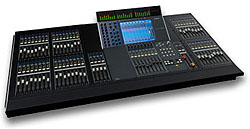Yamaha M7CL-48ES Digital Mixer |

Product Code: M7CL48ES

 |
• Two EtherSound ports for easy auto-configured connection to SB168-ES(Optional) stage boxes in daisy-chain or ring configuration.
• A third port (EtherSound) is provided for permanent connection to a computer.
• 48 mono and 4 stereo inputs (a total of 56 mixing channels), 16 mix buses, LCR bus, 8 matrix channels, and 8 DCAs.
• 8 assignable omni inputs and outputs, and 3 Mini-YGDAI card slots.
• Virtual effect and EQ rack: up to 4 simultaneous multi-effect processors; up to 8 simultaneous 31-band graphic EQs.
• Centralogic interface: central, logical, and intuitive.
• Dual power modes: use the built in power supply, or add an external PW800W power supply unit for failsafe dual-supply operation.
The Yamaha M7CL-48ES series is a digital live-sound console that carries on the digital evolution from the acclaimed PM1DV2 and PM5D consoles. It includes an impressive
array of advanced concepts such as the "Centralogic™" control interface that makes it as easy and intuitive to use as an analog console, and in-depth access
management facilities that will be particularly appreciated in installations.
The Yamaha M7CL-48ES is familiar and comfortable to use, offering a level of convenience
that overturns the preconception that "digital is difficult". A surprising range of functions that you would normally have to supply in the form of peripheral
equipment is built in, and all of this is provided in a space that is dramatically less than an analog console of similar scope. The M7CL is the ideal
digital mixing console for medium size live sound applications that have previously been handled by analog gear. |
 |
Onboard EtherSound and 3rd Port
Where the original M7CL-48 has 48 analog inputs, the Yamaha M7CL-48ES has a total of three EtherSound ports: two for connection to as many as three Yamaha SB168-ES EtherSound stage boxes in either daisy chain or ring
configuration. The 3rd port allows permanent connection to a computer while the stage boxes are connected in ring mode. |
| |
|
 |
Auto-configuration for Plug-and-Play Convenience
To set up a basic daisy-chain system all you need to do is connect the Yamaha M7CL-48ES to the SB168-ES stage boxes via appropriate cables and turn on the power. The ESMonitor software is not required. Everything is
configured automatically, and you don't even have to set or worry about the order of the ID numbers of the SB168-ES units used. Switch a few settings and setting up a ring network is just as easy. |
| |
|
 |
Analog Insert via OMNI I/O
Although the 48 analog inputs are replaced by EtherSound ports, the Yamaha M7CL-48ES retains eight OMNI inputs and eight OMNI outputs that can be used for direct analog connection. These provide an ideal way to insert
outboard processors and other equipment. |
| |
|
 |
Data Compatibility with All M7CL Consoles
The Yamaha M7CL-48ES is compatible with backup data created by the M7CL-32 and M7CL-48 consoles, so time and effort you've spent creating finely-tuned setups for the M7CL-32 or M7CL-48 won't be wasted. |
| |
|
Three Slots for Flexible System Expansion
The Yamaha M7CL-48ES retains the three Mini-YGDAI expansion slots of the M7CL-32/48, so expandability is not reduced in any way. The expansion slots can be used to add analog or digital I/O, versatile Aviom personal
monitoring systems, direct live recording capability via high-performance Dante digital media networking, the ability to use multiple external processing plug-ins via the Waves SoundGrid system, and more. |
|
| Outline |
M7CL-48ES |
| Mixing capability |
Mixing channels |
48 Mono + 4 Stereo |
| GROUP |
16 MIX (Group/AUX) busses |
| AUX |
16 MIX (Group/AUX) busses |
| MAIN |
Stereo, Mono |
| MATRIX |
8 (Can be used as AUX by "Input to Matrix" function) |
| DCA/VCA |
8 |
| Input channel functions |
HPF, Attenuator, 4-band PEQ, 2x Dynamics, Pan (LR or LCR with CSR) |
| Output channel functions |
Attenuator, 4-band PEQ, Dynamics |
| On-board processors |
4x GEQ, 4x GEQ/SPX (GEQ: 31-band or 2x Flex15), 68x Output port delay |
| I/O |
Mic inputs |
0 (Use SB168-ES for physical I/O) |
| Line inputs |
4x Stereo (Compliant with mic input) |
| AD converter |
24-bit; 128-time over sampling |
| Line outputs |
8 Omni output |
| DA converter |
24-bit; 128-time over sampling |
| Digital I/O |
3x EtherSound, 2tr out |
| Expansion slots |
3x Mini-YGDAI (16-in/16-out) |
| Control and others |
Ethernet, MIDI, Remote (HA remote), USB (Storage/Key), Word clock I/O, 2x Lamp (12V) |
| Phantom power |
- |
| General specifications |
| Internal processing |
32bit, Accumulator: 58bit |
| Sampling frequency rate |
Internal |
44.1kHz, 48kHz |
| External |
44.1 kHz (-2.5%) to 48 kHz (+2.5%) |
| Signal delay |
Less than 2.5 ms (@48kHz) |
| Total harmonic distortion |
Less than 0.05% (20Hz-20kHz) |
| Frequency response |
0, +0.5, -1.5dB 20Hz-20kHz |
| Dynamic range |
DA: 110dB; AD+DA: 108dB |
| Hum & noise level |
Equivalent input noise |
-128dBu |
| Residual output noise |
-86dBu |
| Crosstalk |
-80 dB Adjacent Input Channels, Input to Output |
| Power requirements |
AC100-240V 50/60Hz, and/or Use PW800W |
| Power consumption |
150W, 190W (When use with PW800W) |
| Dimensions |
W |
1274mm; 50-3/16in |
| H |
286mm; 11-1/4in |
| D |
701mm; 27-5/8in |
| Net weight |
46kg; 101.4lbs |
| Accessories |
Owner’s Manual, AC power cord, Dust cover |
|
|
|
|
|


